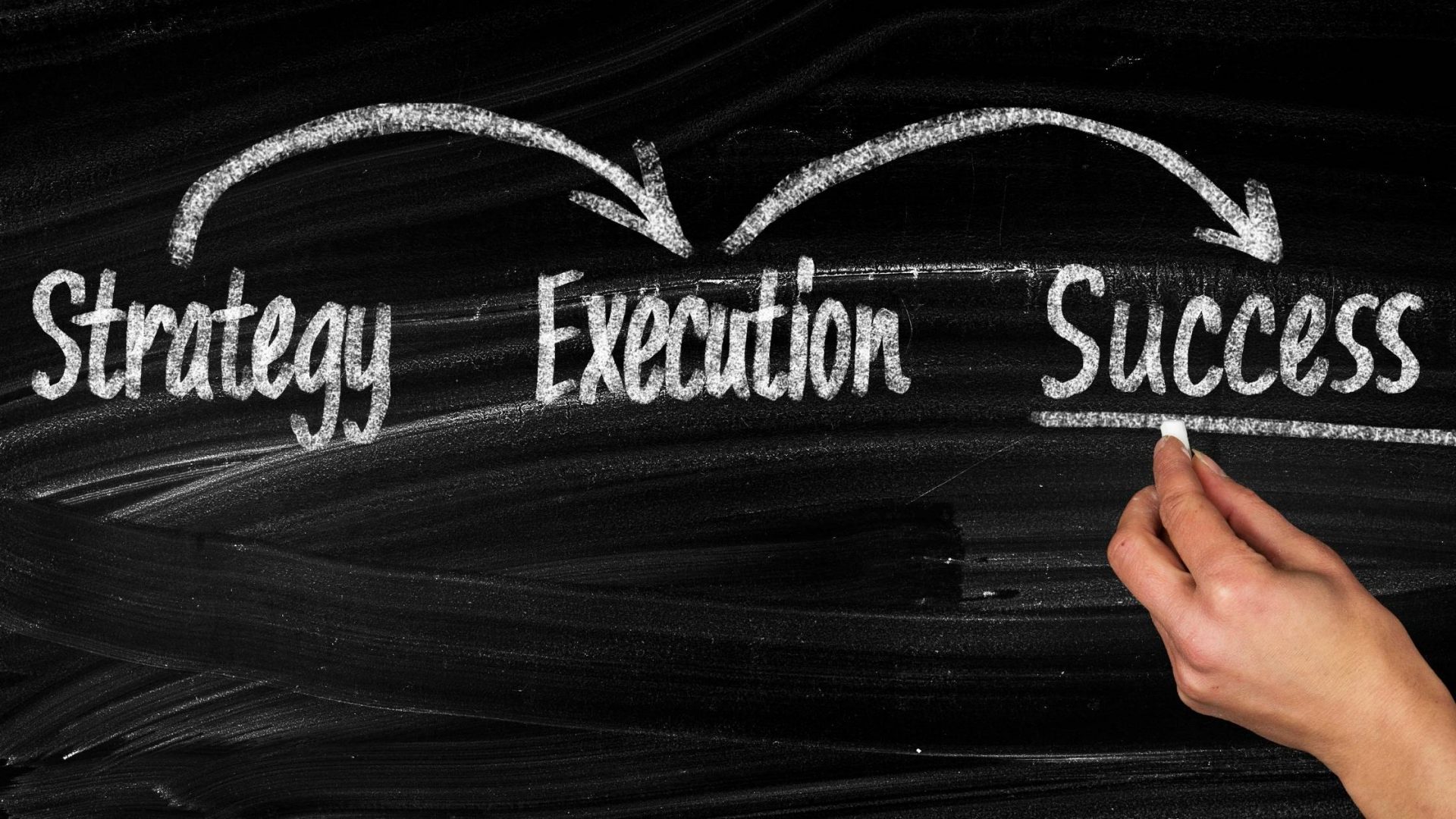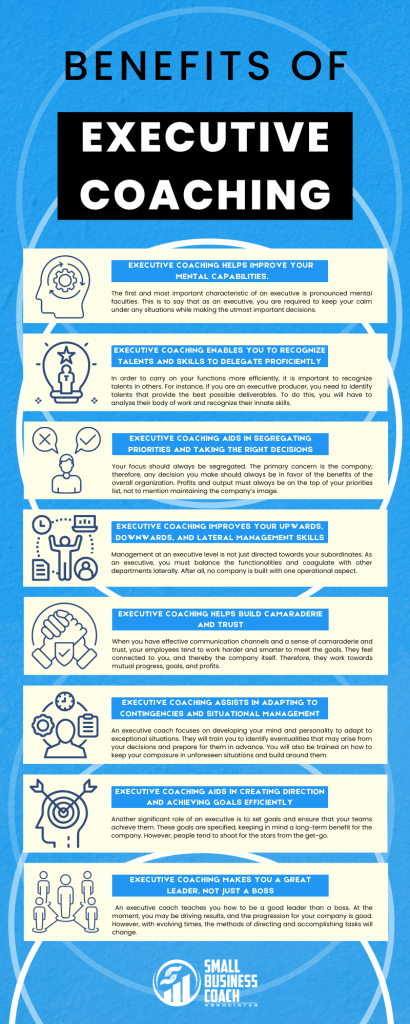VIEW BY TOPIC
- Finding Customers
- Business Systems
- Managing Employees
- Leadership
- Managing Money
Related Posts

Ready to Grow Your Business Fast?
Here’s How I Grew Five Businesses, and Eventually Sold One to a Fortune 500 Company.

All You Need to Know About Executive Coaching
Understanding what Executive Coaching is all about
Executive Coaching, Mentoring, Leading… These are all variations on a theme where the objective is to improve your performance level, while still pursuing personal development. Coaching, in itself, is an acquired skill that every leader must possess. Not only can an executive coach help refine your abilities as a leader but you can further train your employees, using these methods, to improve their performances as well.
There are multiple levels of coaching and directions you will require through the course of your career. No single approach has the same outcome in coaching techniques. Every individual is different and so are their learning capabilities, performance cues, coherence, and comprehension. Therefore, a coach will understand and modify the techniques as per your needs and capabilities as a learner.
Executive Coaching techniques
Coaching is the targeted technique of helping an individual develop their core values and realizing their goals. Then specific steps are taken, focusing on self-improvement, realizing their potential, setting specific ambitions, and developing realistic methods to reach those goals.
A coach has a great responsibility as the learner is wholly dependent on the coaching techniques to meet their life goals. These could be career-oriented or personal ones. Either way, the coach must help the learner realize their strengths and weaknesses and work on further developing their strengths to capitalize on them and overcome what weaknesses can be managed.
Coaching is a highly realistic process. Therefore, the goals and targets must be achievable. It is best to break them down into short-term achievements and accomplishments. This way, the learner experiences the thrill of improvement when they begin to see results. Thus, they tend to dedicate their complete attention and efforts to improve themselves.

There are different levels of coaching:
Let’s start with the basic coaching technique where the learner seeks help from a coach to bridge their gaps in learning and understanding specific nuances that help improve their performance. The shortcoming faced by the learner could be evident, or it may be something they do not realize, which tends to frustrate them.
- A coach must help them realize that shortcoming but also aid in finding new ways to cope with it. A learner must, in turn, be willing to adapt and learn for self-development.
- Once the self-improvement and personal development are complete, the coach and the learner need to focus on bigger goals. Maybe the learner is promoted to a higher post which entails more responsibility and requires focus and leadership.
- To lead others, you must be open to learning to develop, delegate, and provide support. It can be a complex process; therefore, it is only understandable that you seek help from a professional coach to help prioritize your goals. After all, you may be handling a team of ten now, but we’re sure you wish to climb the corporate ladder until you manage a team of ten thousand.
- Higher ambitions require higher levels of focus, priorities, and capabilities. Don’t be ashamed of seeking help to improve yourself. The more you learn, the better you perform; therefore, the higher up you climb.
- When you recognize the needs of your ten employees and elevate to a higher post where you handle a hundred or thousand, you are already in a great position to inspire your subordinates. However, when you reach an executive level, you have a greater responsibility to not only manage your employees and their performance but also a segregated set of responsibilities.
- This is where executive coaches come into play. They help you recognize and evaluate your potential as well as those of your subordinates, thus improving the overall performance of your company.
Let us talk about executive coaching in detail.
Who is an executive coach?
An executive coach is a trainer and personal developer specializing in aiding clients in an executive, managerial and supervisory position. These job titles have greater responsibilities and require a special set of skills.
An executive coach focuses on helping the client realize their objectives and ambitions and define a multitude of structural and behavioral techniques to accomplish them. Coaching does not entail telling the learner what to do; rather, it aids them to grow and develop so they can make smarter choices and decisions on their own.
An executive coach will enlighten you with the different ways you can use your skills and capitalize on those of others in order to inspire and lead. The main focus of an executive coach is to help you realize your own potential and modify certain behavioral aspects to improve your performance.
In a position of power, you have a great responsibility to lead your employees and subordinates towards a beneficial and mutual goal. An executive coach will help you communicate and achieve these goals with your subordinates with encouragement and leadership rather than anger, micromanagement, and dictating. They teach you how to be an effective leader and accomplish your company and personal goals with integrity.

Why you need an executive coach
As an executive, you may already be an advisor or a C-level supervisory manager. In this case, you have a team of hundreds or thousands working under your supervision.
This is no time to micro-manage. Instead, you need to delegate tasks efficiently for a better outcome. That is one of the things that an executive coach is for.
You are already a great performer, no doubt. But the executive coach will help you further develop your existing skills and update them as per the needs of changing times. Additionally, the coach will help you learn new techniques and skills that are required for your new job title.
An executive coach will train you how to recognize the potential in others to help maximize your employees’ output. Everyone has a unique skill, just like you did when you were in their position. As an executive, your primary focus should be to lead your employees for better and nuanced output.
An Executive coach teaches you how to lead rather than boss people around. This encourages your employees to look up to you for guidance and idealization, which in turn improves the overall performance of the company. If you are a business owner, then congratulations, your company is about to reach new heights. If you are a C-suite executive employee, then your board of directors is about to be very impressed with your performance, and your leadership skills are going to be renowned, thanks to your decision to hire an executive coach.
You made the right choice for your career, and you are about to be rewarded for it.

The immeasurable benefits of Executive Coaching
Now that you know executive coaching is an invaluable solution, let’s see how you can benefit from this technique.
There is a multitude of benefits to executive coaching. These phenomena immensely equip you to handle all manners of business and personal problems with utmost care and decisiveness.
-
Executive Coaching helps improve your mental capabilities.
The first and most important characteristic of an executive is pronounced mental faculties. This is to say that as an executive, you are required to keep your calm under any situations while making the utmost important decisions.
It is not ideal for an executive to lose their cool when their decisions are going to impact the company or organization in its entirety. Regardless of your job role as an executive assistant or the Chief Executive Officer, the decisions you make affects the roles and functions of many. Therefore, it is important to exercise serenity in the face of upheavals. You must not stress out over small triggers or react to everything that crosses your desk.
An executive coach specializes in improving your mental capabilities. They train you to remain level-headed under all circumstances, no matter how dire. Remaining composed under challenging situations facilitates a better understanding of the problems.
When your mind is not burdened by the problems or overwhelmed, you can analyze and evaluate situations more effectively. The solutions come easily when your mind is tranquil. You can make the right decisions based on facts and figures rather than overbearing emotions.
-
Executive Coaching enables you to recognize talents and skills to delegate proficiently.
The job of an executive doesn’t always mean that of the CEO. You may be the executive manager, executive recruiter, executive producer, executive analyst, or work in any number of executive positions.
In order to carry on your functions more efficiently, it is important to recognize talents in others. For instance, if you are an executive producer, you need to identify talents that provide the best possible deliverables. To do this, you will have to analyze their body of work and recognize their innate skills. Then you must delegate to them what they are best suited to do. Similarly, if you are an executive recruiter, it is your responsibility to fill the gaps in the company. You need to hire people who are well-equipped to handle the responsibility.
If you are an executive manager, you need to realize what your individual subordinates are good at and delegate tasks according to their skills regardless of their position in the company. I can go on about each job function; however, let’s focus our attention on what they all have in common.
In each executive-level position, it is imperative that you learn the strengths and weaknesses of your employees and subordinates. As an executive, no matter your profession, it is under your purview to nurture their talents and unique selling propositions.
That is precisely what you learn with executive coaching. You will, no doubt, recognize your own strengths and weaknesses and harness your innate skills, but it is also necessary to identify them in others.
As an executive, you cannot handle everything yourself. You are required to delegate tasks as per the merits of your underlings. Therefore, it is important to assign them tasks that they are good at. You can help them improve upon their skills, of course, but more than that, you need to fuel their passion and capitalize on their capabilities.

-
Executive Coaching aids in segregating priorities and taking the right decisions.
As an executive, you have a higher responsibility. Since your decisions impact the organization as a whole, you must learn how to prioritize for maximum efficiency and benefits.
Your focus should always be segregated. The primary concern is the company; therefore, any decision you make should always be in favor of the benefits of the overall organization. Profits and output must always be on the top of your priorities list, not to mention maintaining the company’s image. Every decision you make must reflect the goodwill and merits of the entire organization.
Then comes your team. As an executive, you have countless people depending on you. Therefore, ideally, your immediate next concern after the company is its employees and your subordinates. Their well-being and their progress impact the company significantly. So, make decisions that benefit them in one way or another.
Only when your company and your employees yield satisfactory results must your attention focus on yourself and the well-being of your personal life.
These priorities may be a little difficult to adapt to, given the drive of human nature. Thus, an executive coach is the ultimate solution to train and guide you in the decision-making process. Keep in mind; an executive coach will never tell you what to do, instead show you the right way. It is your decision at the end of the day because you hold the power. Nevertheless, they are like your corporate north star.
-
Executive Coaching improves your upwards, downwards, and lateral management skills.
Management at an executive level is not just directed towards your subordinates. As an executive, you must balance the functionalities and coagulate with other departments laterally. After all, no company is built with one operational aspect.
Regardless of the industry you cater to; you will invariably have a financial, operational, and marketing team. You may also have production, manufacturing, research and development, sales, distribution, and various other departments as well. These may be segregated in larger companies or people wearing multiple hats in smaller ones. To successfully project your company image and grow your revenue, all the departments must coordinate with each other.
As an executive, your role is to ensure that each department is serving its functions towards the mutual goal of the company.
Then we have the subordinates who are directly or indirectly working under you. It is primordial to focus on their development and involvement as they cumulatively contribute to your set goal. You must always encourage and provide support for your subordinates to grow and learn.
Finally, you have responsibilities towards your superiors. As a CEO, you may have to answer to the business owner and the board of directors, while as an executive recruiter, you may have to answer to the CEO and HR manager. As a business owner and executive, you may have to answer your investors. Every executive role is required to provide accountability.
Therefore, it is crucial to learn how to efficiently manage your responsibilities in the upward, downward, and lateral directions, and that is what an executive coach enables you to do. They will hone your management skills so you can balance all the departments, subordinates, and your superiors with utmost ease and efficacy.

-
Executive Coaching helps build camaraderie and trust.
As an executive, it is essential to cultivate good relations with everyone. Most people tend to misunderstand the concept and think that their concerns only lie with their peers and superiors. However, your employees are reliant on you. Therefore, it is vital to build good relations with them as well.
Consider this: If the company is going through a setback because of fewer resources, or lack of funding, or external factors, your employees will still expect to be paid in full. However, you may not have the funds to suffice the tremendous expense.
If you let them go, then they can sue for wrongful termination. If you don’t pay, they can sue you for negligence and fraudulent behavior. Nevertheless, if you have good relations with them, you can explain why you must delay and relay your concerns to them about the company’s performance.
When you have effective communication channels and a sense of camaraderie and trust, your employees tend to work harder and smarter to meet the goals. They feel connected to you, and thereby the company itself. Therefore, they work towards mutual progress, goals, and profits.
Executive coaching targets this innate need for transparency and building substantial relations with employees, investors, and superiors alike. Each is an important cog in the company’s overall performance; thus, your communication must always be effective and professionally cordial.
-
Executive Coaching assists in adapting to contingencies and situational management.
An executive faces a multitude of scenarios that are unplanned or unprecedented. However, it is your responsibility to manage them and bring forth beneficial results.
As a high-level executive, it is necessary to prepare for contingencies. You must always think three steps ahead of everyone else and anticipate the failures or inordinate success as they come.
An executive coach focuses on developing your mind and personality to adapt to exceptional situations. They will train you to identify eventualities that may arise from your decisions and prepare for them in advance. You will also be trained on how to keep your composure in unforeseen situations and build around them.
As stated earlier, you can accomplish more with a calm mind. Executive coaching enables you to practice tranquility and keeps you from being unruffled during emergencies.

-
Executive Coaching aids in creating direction and achieving goals efficiently
Another significant role of an executive is to set goals and ensure that your teams achieve them. These goals are specified, keeping in mind a long-term benefit for the company. However, people tend to shoot for the stars from the get-go.
This can cause serious problems such as:
Your goals may be unrealistic,
- It drives your employees over the edge, thus hampering productivity,
- It affects your mood and, thereby, your behavior, causing you to lash out and destroy your goodwill with your employees.
In order to achieve your long-term goals, you must set short-term goals first that are more focused and company-oriented. Executive coaching is all about setting primary and secondary goals for development. An executive coach will teach you how to break down your ultimate goal into sub-goals that are easily achievable.
This invariably reduces the stress on you and your employees, thus enabling you to perform better and much more efficiently. The smaller goals are easier to complete, and they contribute towards the bigger picture. Your decisions, thus, have a defined direction and benefit your company in the long run.
-
Executive Coaching makes you a great leader, not just a boss.
An executive coach teaches you how to be a good leader than a boss. At the moment, you may be driving results, and the progression for your company is good. However, with evolving times, the methods of directing and accomplishing tasks will change.
- Primarily, it is crucial to learn new techniques. You may be adamantly implementing a tried and true method, but maybe your employee has a revolutionary solution. Instead of discarding their ideas, you must encourage them.
- Your communication goals must always be to lead by example rather than bark orders.
- It is crucial to take empathy into account as an executive.
It is understandable that the job of an executive is stressful and strenuous. That is why executive coaching can provide substantial insight into the process. An executive coach will train you into becoming an effective and goal-driven leader rather than a boss with an iron fist. I need not tell you which is better because you already know the stories of Hitler and Mussolini. Aim to be similar to Elon Musk instead.
At Small Business Coach Associates, our executive coaching program is more than just training to do your job well. It enables you to improve the productivity of the overall organization. You begin to observe noticeable personal development that in turn changes your outlook towards your job role. For more information, schedule a complimentary coaching session here.
An executive leading by example is always admired and harnesses loyalty from their employees which translates to increased efficiency and output. That is exactly the kind of principles we impart so your overall performance hikes exponentially.
Summary
Executive coaching prepares you for the highs and lows of your job role, encourages enhanced mental health, teaches you to be a good leader, and most prominently, qualifies you to handle your job functions with ease. Read this article on What is Business Coaching?















